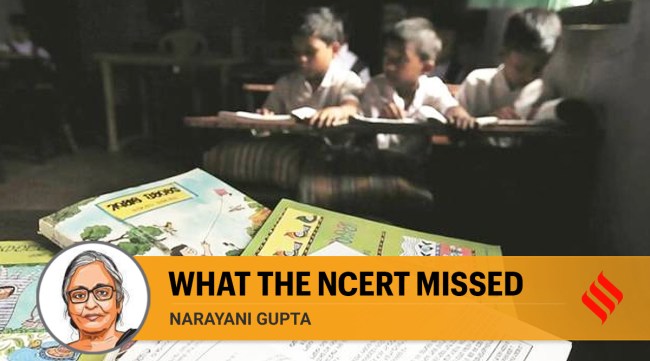Opinion Narayani Gupta writes: NCERT deletions discourage debate
Thoughtful histories do not simply glorify or denigrate rulers, they explain the intersection between the earth and human activity, between the forces of nature and technology. They help us understand the world
 The NCERT states that “the omissions in the textbooks may have been unintentional, [but] … declined to reverse the deletions. Omissions? Are they different from “deletions”? (Representational Photo)
The NCERT states that “the omissions in the textbooks may have been unintentional, [but] … declined to reverse the deletions. Omissions? Are they different from “deletions”? (Representational Photo) 2023: The uncertainty is on my side. At the NCERT there is calm confidence about its exercise in “rationalisation” (a favoured “official” term, also recently used in a report to suggest that the number of monuments under the ASI is “rationalised”).
What is being called “The NCERT controversy” is a misnomer. It is not a debate. An act of “rationalising” by pruning parts of the textbooks written in 2005 led to protests by the editors and others — 35 editors asked that their names be dropped from future editions, and now comes a reprimand from 73 educational worthies implying that these editors are being disrespectful to the NCERT.
The NCERT states that “the omissions in the textbooks may have been unintentional, [but] … declined to reverse the deletions. Omissions? Are they different from “deletions”? Try to get your head around that one.
There are three (or four?) sets of players: One, the editors/authors of the 2005 textbooks (named); two, the experts who recommended the pruning; three, the NCERT officials (unless they are the same as 2 above); and four, the 73 educational authorities who have supported the pruning (named).
There are five grey areas. One, there are no specific explanations of why certain chapters or sections have been deleted. It is not stated whether this is in terms of teaching overload, comprehension challenges or being outdated. Clarity is called for, not innuendo. Two, we need to hear what school teachers have to say, not university academics. The latter can provide the material for chapters of the textbooks, but it is school teachers who are the conduit of knowledge to the students.
Three, is there any survey of students’ reactions to the themes of the deleted chapters? Four, how many of the 73 signatories — busy vice-chancellors and senior academics — had time to read and reflect on the chapters now in the rubbish bin? Five, why do we not know the names of the experts who suggested the deletions? (see Peter Ronald DeSouza, ‘Why I said, not in my name’, IE, June 17).
The deletions from textbooks of political science and Indian history were done last year. Most recently, ‘Themes in World History’ (Class XI) has also been “rationalised”. Four chapters have been consigned to the guillotine. I would really appreciate being told the reasons. These were written by excellent scholars, excellent not only in their wisdom but in their ability to communicate to young people — Supriya Verma, Najaf Haider, Lakshmi Subramanian and Arup Banerji. As with the other essays, these were finalised after discussion by the larger group of editors, modified, and rewritten.
One can visualise a lively seminar on the “banned chapters”, like seminars on books banned by the colonial government in India. One can discuss the deleted chapters, the coincidence of the narrative of the stages of human evolution being objected to in many countries by people of different religions, the chapter on the conquest of South America being unimportant. One can speculate whether the details of the Industrial Revolution are objectionable because they “glorify” Britain. For heaven’s sake, let us talk and argue about content. We have always been argumentative people. Why this silence now? And isn’t it obvious — and ironical — that banning books or chapters simply inspires new interest in the subject and is therefore counter-productive?
2005: I hope, as younger Indians stir the cooking pot of history in years to come, they can generate some of the exhilaration we felt 18 years ago when these textbooks were discussed. No one can take that magic away from my memory — from choosing the paper of the right gsm (the cynics told me it was a con, and that after printing some hundreds on the good thick paper, the remaining 1,000s would be on cheaper paper), choosing beautiful illustrations in full colour, whole sections of chapters relentlessly rewritten, the joy of approval by friends and my daughter (who went so many extra miles to help), the arguments with team members, the satisfaction of having American scholars approving the unorthodox chapter on American history, where the indigenous people were put centre stage…
The Future: History textbooks have to be taken seriously. By everyone. For the vast majority of our literate citizens, school textbooks are the only history they will read. Artists, writers, and researchers have to pitch in to make them unforgettable. Writing a novel that may become a best-seller has its own thrill, but think for a minute of the satisfaction of giving your best for thousands of young minds. Recall Charles Dickens making time to write A Child’s History of England. Thoughtful histories do not simply glorify or denigrate rulers, they explain the intersection between the earth and human activity, between the forces of nature and technology. They help us understand the world.
The writer is a Delhi-based historian



